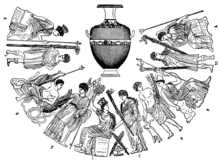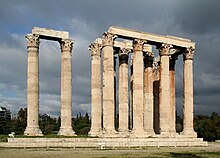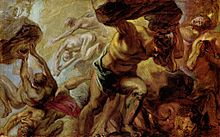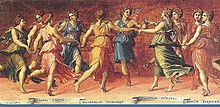Greek mythology
The Greek mythology includes the entirety of the ancient Greek myths , so the stories of gods and heroes ( heroes ) of ancient Greece .
swell
Mythical content can be found in almost every genre of ancient Greek literature and was already characteristic of poetic fiction, according to Greek and Roman opinion. Up to the classical period , epic , choral poetry and tragedy were the preferred genres in which mythical subjects were dealt with, from Hellenism onwards more collections were added. The oldest surviving texts are the Cyclical epics of Homer and the goddess epics of Hesiod , which Herodotus already regarded as authoritative for the Greek myths of gods.
In the Greek conception of history, historical time goes back to the mythical time, mythical heroes were regarded as mortal people of an earlier epoch, who still communicated personally with the gods. Further important sources that were not understood as poetry are therefore the writings of historians . The writings of local historians, such as those of atthidographers, are particularly productive . From the 5th century BC The first mythographical works were created in which genealogies were established and mythical material was compared with other reports. The Hellenistic library of Apollodorus and the fabulae of Hyginus from the imperial period are regarded as important works . Further sources are commentaries on the great poets and smaller scholia , which contain references to texts that have not survived and myths that have not been handed down otherwise. There are also thematic collections such as the cadastre of Eratosthenes of Cyrene or the Metamorphoses of Ovid.
In addition to written sources, pictorial representations also provide information about Greek myths. From the Geometric period onwards, there were depictions of mythical scenes on Greek vases , which increased in size and complexity up to the Attic red-figure vase paintings of the 5th century. These figurative sources are particularly important because some myths are substantiated by them much earlier than by written sources. In addition, mythical scenes that have not been handed down in literary terms are also shown, but their interpretation and classification is problematic. On the one hand the visual language follows different conventions than the literary one, on the other hand the distinction between mythical representation and everyday representation is not always possible. Representations that are clearly identified as mythical by attributes or inscriptions are therefore of particular importance .
Origin of the gods and the world
Since the first gods in Greek mythology are personifications of parts of the world or fundamental principles, no distinction is made between the origin of the world and the origin of the gods. Numerous myths deal with their origins, but none could prevail as universally valid. The most widespread story of creation is Hesiod's theogony , in which the first attempt was made to create a comprehensive genealogy of the gods from various myths. Most of the later mythographers build on the theogony , but sometimes differ considerably from it in the details. A canonical family tree of Greek gods could never emerge.
In theogony , chaos is placed at the beginning. For Hesiod, the world is not created out of nothing; there is matter, but no form and no order. From the chaos emerges as the first generation of gods the earth Gaia (first in "earth form" , later in "human form"), the underworld Tartaros , the love Eros , the darkness Erebos and the night Nyx . From the connection of Nyx and Erebos arise the day Hemera and the air Aither , Nyx brings forth from itself a series of deities which are either personifications of night-related phenomena or of human evils. The largest part of the Greek world of gods is traced back to Gaia, who produced the sea of Pontos , the mountains Ourea and the sky of Uranos out of herself and, in particular with Uranos, had a multitude of other descendants. In addition to the origin of the gods, the theogony tells of the sequence of rulership over the world, which plays a central role in most of the Greek genesis myths. The first ruler of the world, Uranos, is emasculated and disempowered by his son, the titan Kronos , whereupon the titans rule the world. The titans are again overthrown by Kronos' son Zeus , after which the reign of the Olympian gods begins . Zeus secures his rule by devouring his pregnant wife Metis , since her unborn son would have been destined to take the place of Zeus.
Another genesis myth that has gained some popularity is the Orphic creation story . Although the traditional creation myths of the Orphics do not suggest a canonical version, they have some similarities. The Orphics start with the time Chronos , from which Aither, Erebos and Chaos are descended. Chronos creates an egg in Aither from which Phanes , the creator of all things, hatches. Phanes hands over the rule to his daughter and wife Nyx, who in turn hands them over to their son Uranus. When Zeus takes power, he devours Phanes and creates the world anew. He marries Kore and becomes the father of Zagreus - Dionysus , to whom he passes his rule on.
Family trees of the gods
Family tree of the pre-Olympic gods according to Hesiod's theogony
Family tree of the Olympian gods
| Kronos | Rhea | ||||||||||||||||||||||||||||||||||||||||||||||||||||||||||||
| Hestia | Hades | Poseidon | Demeter | Zeus | Hera | ||||||||||||||||||||||||||||||||||||||||||||||||||||||||
| Athena | Apollo | Artemis | Hermes | Dionysus | Hephaestus | Ares | Aphrodite | ||||||||||||||||||||||||||||||||||||||||||||||||||||||
Figures of Greek mythology
Olympic gods
The rule of the Olympians begins with the overthrow of Kronos by his son Zeus. These are:
- Zeus
- the five siblings of Zeus: Demeter , Hades , Hera , Hestia and Poseidon
- the ten divine children of Zeus:
- two children of Zeus by mortal women who were later admitted to Olympus:
Other gods
- Acheloos : the oldest and most distinguished of the Greek river gods; must, defeated Heracles in battle, leave the cornucopia to him
- Aletheia : goddess of truth
- Anemoi : wind gods
- Asclepios : god of healing
- Ate (also: Apate ): daughter of Zeus, who plunges gods and humans into disaster
- Charon : Ferryman in the underworld who guides the dead across the Styx for a fee
- Hecate : goddess of magic, necromancy, spook and crossroads
- Hesperides : nymphs who guard a tree with golden apples together with Ladon. These give the gods eternal youth
- Horen : Goddesses of the times of the day and seasons (Greek: ὧραι hōrai = "hours") and of the regulated life
- Hypnos : God of sleep, the brother of death Thanatos and father of dreams
- Iris : messenger of the gods, goddess of the rainbow, mediator between gods and humanity, daughter of Thaumas and Elektra , sister of the harpies and wife of Zephyros
- Moiren : group of three of goddesses of fate
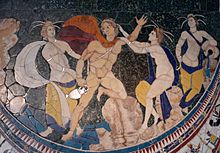
-
Nymphs : female deities of lower rank, personifications of natural forces
- Nereids (sea nymphs): 50 daughters of Nereus, nymphs who protect castaways and entertain sailors with games
- Naiads (freshwater nymphs)
- Napaien (valley nymphs)
- Dryads (forest and tree nymphs)
- Leimoniads (meadow nymphs)
- Oreads (mountain, grotto and cave nymphs)
- Hyades (rain nymphs)
- Pleiades (seven stars)
- Oneiroi : dreams, sons and / or brothers of the sleep god Hypnos
- Pan : Shepherd god with goat feet
- Plutos : the wealth
- Prometheus : son of the titan Iapetus, bringer of fire and founder of human culture.
- Thanatos : god of death
- Tyche : Goddess of Destiny
- Zelos : god of jealousy
Demigods, heroes and humans
- Achilles , Achilles : greatest Greek hero before Troy, son of Peleus and Thetis, who initially hides him among the daughters of Lycomedes, discovered by Odysseus and brought to Troy; the wrath of Achilles (his quarrel with Agamemnon) is the central motif of the Iliad
- Agamemnon : Commander-in-chief of the Greeks before Troy, slain by his wife Clytaimnestra and her lover Aigisthus on his return, avenged by his son Orestes
- Agenor : King of Phenicia, father of Europe kidnapped by Zeus in the form of a bull to Crete (where she becomes mother of the three legendary Cretan rulers Minos, Rhadamantis - the later judge in the underworld - and Sarpedos), the later founder of Thebes, Kadmos , and Phineus, pursued by the harpies and redeemed by the Argonauts
- Aigisthos : cousin of Agamemnon and in his absence entrusted with the rule of Mycenae; Lover of Clytaimnestra during Agamemnon's absence; murdered Agamemnon with her on his return home; slain by Agamemnon's son Orestes
- Ajax the Great : powerful Greek fighter before Troy, only surpassed by Achilles; helps to rescue Achilles' corpse, but as his armor the Ulysses is awarded, he goes into a frenzy and then kills himself
- Ajax the little one : fastest runner after Achilles; Defiler of Kassandra in the Temple of Athens, but sunk by gods on the way home
- Akademos : saves Athens from destruction by the Dioscuri by betraying its king Theseus , his burial place akademeia gives the academy its name
- Alcmene : mother of Heracles, whom she fathered with Zeus, who appeared to her in the form of her husband Amphitryon
- Amazons : matriarchally organized people
- Amphitryon : husband of Alcmene, in whose shape Zeus seduces her to beget Heracles
- Andromeda : Ethiopian princess who is to be sacrificed to the sea monster Ketos, sent by Poseidon to punish her mother's hubris, to appease him, already forged on a rock, freed by Perseus, gives birth to many children (including the ancestors of Heracles and the Persian kings ) and is later transported to the sky with it as a constellation
- Arachne : an excellent weaver who challenges Athena and whether this hubris is transformed into a weaving spider by her
- Argos, man : the founder of the city of the same name
- Ariadne : daughter of Minos, gives Theseus a ball of wool and a sword that save him in the labyrinth
- Atalanta : Amazonian, unmarried, fast hunter, suckled by a bear, involved in the hunt for the Calydonian boar
- Bellerophon : slandered by the wife of Proitos, who was rejected by him, King of Tiryns in Crete, then sent to Lycia with the plan to have him murdered there, but he survives all tasks; Conqueror of the Chimera, tries to reach the top of Mount Olympus on the back of Pegasus
- Daidalos : Cretan inventor and builder, builder of the bronze cow of the Pasiphae and the labyrinth, flees from Minos from Crete to Sicily by means of self-made wings, father of Icarus
- Danaids : 50 daughters of the ancestor of the Greeks, Danaos; should the 50 sons of Aegyptus marry and kill them on their wedding night; only one spares her husband; sent to the Tartaros for this, where they have to scoop water into a leaky barrel with a sieve (picture of the earth's water cycle)
- Deucalion : son of Prometheus, escapes the great flood imposed by Zeus
- Dioscuri : twins Castor and Pollux, companions of Jason and Heracles.
- Elektra : daughter of Agamemnon and Klytaimnestra, helps Orestes to avenge their father
- Europe : kidnapped by Zeus in the shape of a bull to Crete, with Zeus and others mother of Minos
- Eurystheus : King of Mycenae, known for the twelve duties that he imposed on Heracles
- Hecabe : wife of Priam, mother of Hector, Paris and many other Trojan heroes
- Hector : most important hero and general of Troy, son of Priam
- Helena : Princess Helena "the beautiful Helena" of Troy and Queen of Sparta. Daughter of Zeus and Leda. As the most beautiful woman in the world, she is said to have caused the Trojan War, after which the Trojan prince Paris kidnapped her to Troy.
- Hero : Aphrodite priestess on the Hellespont strait, which her lover Leander swam through every night
- Jason : went out with the 50 Argonauts to steal the golden fleece, which he finally obtained with Medea's help
- Ikaros : Son of Daedalus, falls into the sea on the flight from Crete to Sicily
- Ixion : Person who first murdered a relative, sent to Tartarus for this
- Kassandra : daughter of Priam, seer in Troy, who no one believes
- Kirke (Roman: Circe ), sorceress
- Laocoon : according to Virgil's Aeneid Apollo priest, warned the inhabitants of Troy against pulling the wooden "Trojan horse" into the city ("Danaer gift"); to prevent him from doing so, Athena, on the side of the Greeks, sends two sea serpents, which strangle him and his twin sons
- Leander : lover of the hero who drowned on the way to her in the Hellespont
- Medeia (Medea): daughter of the Colchian king who knows magic, helps Jason to steal the golden fleece out of love, flees with him to Greece, kills her children out of jealousy when Iason Creon's daughter Glauke turns to
- Melampous : seer and healer who understood the language of animals
- Menelaus : King of Sparta, brother of Agamemnon, husband of Helen, who stole Paris from him and kidnapped him to Troy
- Minos : King of Crete, locks the Minotaur, which his wife Pasiphae fathered with Poseidon's bull, in the labyrinth and wages war with Athens to feed it
- Nestor : Ruler of Pylos, tries to settle the dispute between Agamemnon and Achilles, Argonaut


- Oidipous (Oedipus): son of the king of Thebes, whom he unknowingly kills, and his wife Iokaste, whom he later marries
- Odysseus : most cunning of the Greek heroes before Troy, King of Ithaca
- Oknos : condemned to weave a rope from rushes, the finished end of which was always eaten by a donkey
- Orestes : son of Agamemnon and Klytaimnestra, brother of Iphigenia
- Orpheus : singer, inventor of music and dance, even beguiles Hades, who gives him back his wife, who died of a snakebite, but whom he loses again to Hades through his unauthorized gaze at his beloved during the ascent from the underworld, Argonaut
- Paris : son of King Priam of Troy, robber of Helen
- Pasiphae : wife of Minos, begets the Minotaur with the bull sent by Poseidon in the Daidaloic cow
- Penelope : Wife of Odysseus, has to fight back numerous suitors during his absence
- Perseus : abandoned son of the king of Argos, defeated the Gorgon Medusa, used her head to turn Atlas into stone
- Priam : King of Troy, husband of Hecabe, father of Hector, Paris and many other Trojan heroes
- Pyrrha : only surviving woman after the ducal flood
- Sisyphus : betrayed the plans of the gods and had to roll a boulder up a slope in Tartaros, which then rolled down again and again
- Tantalus : ancestor of the Tantalids, king of Lydia, ancestor of Agamemnon, at first he was friends with the gods (he was even allowed to dine with them) but then he became enemies because he cooked his son and served him as a meal for the gods. As punishment, he had to suffer from hunger, thirst and agony, even though he is standing in a lake and fruit trees grow around him. He was terrified to death because of a large boulder hanging over him. Two of his descendants are Pelops and Niobe.
- Telemachos : son of Odysseus and Penelope, helps his father who has returned home in killing the suitors
- Theseus : one of the most famous heroes of Greek mythology, king of Athens, Argonaut, Calydonian hunter, conqueror of the Minotaur and the Marathon bull, founder of the Panathenaic and Isthmian games, freed from the underworld by Heracles after the failed attempt to kidnap Persephone
Animals, monsters, giants

- Aithon : eagle that eats Prometheus' liver
- Androgynous : Creatures from which humans emerged
- Areion : very fast wonder horse that could speak
- Argos, the monster (also called Panoptes ): monster with a hundred (or numerous) eyes all over its body
- Argos, the dog : the dog of Odysseus
- Basilisk : King of the Serpents
- Charybdis : sea monster that lived on a strait with the Scylla
- Chimaira (Chimära): fire-breathing hybrid creature with three heads (lion, goat, snake / dragon)
- Erymanthic boar : caught alive by Heracles
- Geryon : Giant with three bodies grown together at the hips; Heracles kills him to steal his herd of cattle
- Gorgons : Frightful figures with snake hair that turn anyone who looks at them to stone
- Gryphos (griffin): Lion with eagle head and wings, symbol of keen-sighted wisdom and vision
- Harpies : hybrid creatures of woman and bird, sisters of the iris; tormented the blind king Phineus, driven out by the Argonauts; people spend in Tartarus and torment them on the way there
- Heraclean snakes : two snakes that Hera sent to kill Heracles, who was a few months old; strangled by this
- Hydra (also called Lernaean serpent): nine-headed sea monster, killed by Heracles; Heracles dips his arrows in their poisonous blood
- Calydonian boar : its killing and the dispute over the fleece, in both Atalante and Meleager are significantly involved, cost many of those involved their lives
- Centaurs : hybrid creatures of horse and human
- Kerberos (dog of Hades, German also Cerberus )
- Kerynite hind (also Keryneische Hindin or Keryneiische Hindin): hind, which devastated fields in Arcadia and which Heracles was only able to capture after a year
- Citharonic lion
- Cretan bull : bull sent by Poseidon Minos as a sign that this should become king; when Minos does not want to sacrifice the beautiful animal to the god, Poseidon lets Minos' wife fall in love with the animal (see Minotauros); brought to Eurystheus by Heracles, but released again (cf.: marathon bull!); later shot by Theseus
- Cyclopes : Design with circular eyes or a single eye on the forehead
- Ladon : Dragon with - depending on the source - 2, 3 or 100 heads, who, together with the Hesperides, guards a tree with golden apples
- Lailaps : the hunting dog of the Prokris and later the Cephalos always beating his victim
- Lernaean snake : nickname of the Hydra, see there
- Marathon bull : identical to the Cretan bull; Heracles releases him after he has brought him to Eurystheus, whereupon he causes much damage, v. a. in marathon, hence the nickname
- Minotauros : monster that the wife of the Cretan king Minos gave birth after she mated with the Cretan bull while hiding in a wooden / bronze cow made by Daedalos; Spent in the labyrinth built by Daedalus, Minos has to sacrifice people
- Nemean lion : lion with impenetrable fur, therefore strangled by Heracles; from then on he wore the fur that he pulled off with the lion's claws as armor
- Orthos : two-headed dog that guards the herd of cattle of Geryos, a brother of the hellhound Kerberos
- Pegasus : winged horse
- Phoenix : Bird that burns and rises from its ashes
- Diomedes' steeds : man-eating horses, Herakles throws Diomedes himself before them and can tame them for a while; later eat Abderos, Heracles' favorite
- Satyrs : forest spirits in the wake of Dionysus
- Sirens : mythical female creatures who, through their singing, lure boaters to kill them
- Scylla : together with Charybdis guards a strait
- Sphinx : Demon of Destruction, puzzled the passing travelers
- Stymphalic birds or stymphalids: birds with brazen beaks, claws, and feathers which they could shoot like arrows; ambush the Argonauts; later driven out by Heracles
- Talos : bronze giant
- Teumessian fox : huge, man-eating fox to which the Thebans had to sacrifice a boy every month
- Tityos : Giant who tried to rape the beautiful Leto
- Triton : Hybrid of human (upper body), horse (front half of the abdomen) and dolphin (rear part of the abdomen), therefore often referred to as the centaur of the sea
- Typhon : Giant that Gaia gave birth to through union with Tartarus in order to take revenge on Zeus for the defeat of her children, the titans and giants
- Centaurs: see under Centaurs
Places that are of particular importance to Greek mythology

- Delphi : City that was best known for its oracle
- Dodona : Oracle site
- Delos : birthplace of Apollo and Artemis, site of a famous Apollo shrine and oracle
- Elysion (lat .: Elysium ): island of the blessed in the far west of the world
-
Hades : place of the dead
- Tartaros : place of punishment of the underworld
- Asphodeliengrund : this is where most of the dead lived as shadows
- Lethe : source from which the souls of the deceased drink the water of oblivion
- Styx : border river to the underworld, which the deceased cross for a fee with the help of the ferryman Charon
- Nekromanteion : the only oracle of the dead in Greece
- Olymp : Abode of the Olympian gods
- Othrys : Seat of the Titans
- Thermodon : River of the Amazons
- Symplegaden (Cyanese rocks): the "clashing", two rock islands
Mythological items
- Aigis : Shield of Athena
- Ambrosia : food and ointment of the gods
- Argo : Ship of the Argonauts
- Thread of Ariadne : Gift of Ariadne to Theseus, with whose help the latter escaped the labyrinth of Minos
- Aesculapian staff : attribute of Asclepius, the god of healing; Symbol of the medical and pharmaceutical status
- Pandora's box : when Pandora opened it, the hitherto unknown evils such as work, illness and death escaped and plagued humanity from then on
- Batylos : a stone that the titan Rhea wrapped in goat skin and had her husband Kronos devoured instead of the newborn Zeus
- Trident : scepter and weapon of the sea god Poseidon
- Wing shoes : received from Hermes on loan to Perseus
- Cornucopia : symbol of good luck, filled with flowers and fruits
- Golden apples of the Hesperides : bestowed eternal youth on the gods
- Golden fleece : fur of the golden ram Chrysomeles , who could fly and speak
- Gorgoneion : severed head of the Gorgon Medusa, part of the Aigis
- Collar of Harmonia : made by Hephaestus, given by Kadmos to his wife for the wedding, only brings bad luck to future owners
- Helmet of Hades : attribute of Hades, makes the wearer invisible
- Hermes rod (Caduceus) has wrapped around two wings of snakes
- Rattle of Athena : handed over to Heracles by Athena to drive away the stymphalic birds
- Nectar : drink of the gods
- Nepenthes : a "worrying" drug that Helena receives from an Egyptian queen
- Omphalos : Cult stone in the Temple of Apollo in Delphi, marks the navel of the world
- Palladion : Carving of Athena in the castle of Troy
- Thyrsus : attribute of Dionysus and his companions
- Trojan horse : a wooden horse portrait in the belly of which the Greek soldiers hid themselves during the conquest of Troy
See also
- General genealogy of Greek-Mediterranean mythology
- Classical mythology
- List of characters in Greek mythology
- List of Greek sagas
literature
Introductions
- Reiner Abenstein : Greek Mythology. KulturKompakt. UTB, 2nd edition 2007
- Jan N. Bremmer (Ed.): Interpretations of Greek Mythology . London 1988, ISBN 0-415-03451-5 . Full text
- Charles Delattre : Manuel de mythologie grecque. Éditions Bréal, Paris 2005, (excerpts online) .
- Fritz Graf : Greek Mythology . Düsseldorf 2001, ISBN 3-491-69041-2
- Simon RF Price : Religions of the Ancient Greeks . Cambridge 2006, ISBN 0-521-38867-8 (reprint of the Cambridge 1999 edition).
- Ludwig Radermacher : Myth and legend among the Greeks . Baden near Vienna 1938
- The immortals - gods of Greece . Art publishing house Josef Fink. Lindenberg 2012, ISBN 978-3-89870-767-1 (book accompanying the special exhibition in the Staatliche Antikensammlung and Glyptothek in Munich with detailed essays by numerous scholars)
Scientific reference works
- Herbert Hunger : Lexicon of Greek and Roman Mythology . Vienna 1953
- Lexicon Iconographicum Mythologiae Classicae : LIMC . Artemis-Verlag, Zurich, Munich, Vol. 1–9, 1981–1999
- Ludwig Preller : Greek Mythology . Updated by: Carl Robert , 4th edition, Berlin 1894–1921
- Wilhelm Heinrich Roscher : Detailed lexicon of Greek and Roman mythology . Teubner, Leipzig 1886–1937
Lexicons and manuals
- Michael Grant : Myths of the Greeks and Romans . Zurich 1964
- Michael Grant, John Hazel: Lexicon of ancient myths and figures . Munich 1976
-
Karl Kerényi : The Mythology of the Greeks . dtv, Munich
- 1. - The stories of gods and mankind . 2003, ISBN 3-423-30030-2
- 2. - The hero stories . 2004, ISBN 3-423-30031-0
- Robert Ranke-Graves : Greek Mythology . Source and interpretation (Rowohlt's encyclopedia), Reinbek 2003, ISBN 3-499-55404-6
- Herbert Jennings Rose : Greek Mythology. A manual . C. H. Beck, Munich 2003, ISBN 3-406-49458-7
- Edward Tripp: Reclam's Lexicon of Ancient Mythology . Reclam, Stuttgart 2001, ISBN 3-15-010451-3
Retelling
- Gustav Schwab : The most beautiful sagas of classical antiquity . dtv, Munich 2005, ISBN 3-423-70314-8
- Michael Köhlmeier : The great book of legends of classical antiquity . Piper, October 2002, ISBN 978-3-492-23804-5
Web links
- Primary u. Secondary text, links in the Perseus Project (Engl.)
- Lexicon at Gottwein.de
- Theoi Project (Engl.)
- Graphic and interactive family tree of Greek mythology (Flash)
- Literature by and about Greek mythology in the catalog of the German National Library
Individual evidence
- ↑ Herodotus : Historien 2, 53.
- ^ Fritz Graf : Myth. In: The New Pauly (DNP). Volume 8, Metzler, Stuttgart 2000, ISBN 3-476-01478-9 , Sp. 640.
- ↑ Fritz Graf: Greek Mythology. An introduction. Albatross. Düsseldorf 2004. ISBN 3-491-96119-X , pp. 190 ff.
- ^ A b Simon Goldhill : Greece . In: Roy Willis (Ed.): Mythologie . Taschen 2007, p. 128.
- ^ Hesiod : Theogony Online (Greek and German)
